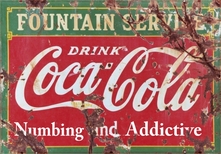
Freedomway.ca
Remember: Please share this article if you find it educational!
What does Coca-Cola, the 59th company on the Fortune 500 and the multi-trillion dollar illegal drug industry have in common?
Both Coca-Cola and Illegal Drugs have:
- Worldwide organizations
- Highly addictive consumable product
- Both have insane profit margins
- Can operate in areas where governments fail (such as war torn zones and socially unstable areas of Africa)
- Line ups of customers waiting to purchase a specific product and will accept no imitations
- There is a concentrated "producer" in both models and a large network of "distributors". Coca-Cola makes it's own syrup and hundreds of "bottling companies" distribute and bottle the mix of water and syrup.
- Established networks of dealers who get paid to move product
Years ago, I was watching a documentary on a war-torn country in Africa. The government had been wiped out and it was nearly impossible to re-establish a government because of civil unrest. Local warlords were constantly threatening any group that wished to take power and the entire country was in chaos.
The documentary also enlightened me as to why Coca-Cola was able to operate in an environment where there was no government or regulatory body to protect their supply chains from bandits, child armies and criminals.
One African man who worked for Coca-Cola attributed the success of the company to the fact that "everyone who touches the product gets paid". This means that everyone who carries it, sells it, distributes it, transports it or markets it gets paid. Government protection or not, this business can function ANYWHERE.
The multi-trillion dollar network of illegal drugs works in the same way that Coca-Cola does. These organizations face daunting odds and have gone to "war" with formidable foes like The United States of America. However, these cartels function and thrive because they have the same philosophy driving their business:
"Everyone who touches the product gets paid".
The farmers who farm the raw materials get paid, the people who process the ingredients get paid, the drug mules get paid, the networks of dealers get paid etc.
Coca-Cola and Illegal drugs have the exact same supply chain philosophy and can operate anywhere in the world against all odds. Both entities have a "Pay Everybody" philosophy and have created an extremely smooth, well organized, well oiled machine.
But what does this mean for you and your business?
Only 2% of business owners understand Joint Ventures, although most of the Fortune 500 companies derive significant revenues from creating joint ventures.
A joint venture is where two companies, people or organizations align their goals for mutual benefit.
The most simple joint ventures are referral commissions: If a customer is referred to a company, the company receiving the referral will pay an ongoing commission on all business done between the new customer and the business. This is extremely lucrative for both the referral client and the receiving company. Ongoing revenue is what keeps the relationship strong and creates incentives for the referral client to continuously send business.
Understanding joint ventures is a huge component to becoming the leader in your market or industry. Since only 2% of entrepreneurs truly understand Joint Ventures, you can have an unfair advantage in your market.
In my own business, I have adopted a "Pay Everybody" policy and have had wild success with the program.
I have access to private real estate deals first before they hit the open market, I have access to Capital that I would not normally have access to, my phone rings all day with opportunities for deals and capital and I don't have time to take every call.
This is an extremely good problem to have.
Most businesses/entrepreneurs spend HUGE budgets on advertising and marketing, I spend virtually zero dollars, but I pay for results.
If someone refers me a private deal, they receive a handsome $500 "thank-you" fee. If another investor has a good deal under contract, I will generally pay $1000-$5000 to purchase the contract and take on the deal myself. I have similar programs in every aspect of my business and I don't spend any money on advertising because:
I pay for results, NOT promises.
In the past, I have been murdered on advertising. A year ago I spent $2700 on a print ad that generated ONE PHONE CALL for my business!
One pathetic inbound phone call and NO SALE. Just a $2700 lead.
I was furious, felt like I had been ripped off by the advertising company and vowed to never ever repeat this mistake. I felt like I was the victim of a ridiculous joke and I will be extremely cautious to repeat any form of print advertising.
Nowadays, I spend $0 on advertising and my phone rings off the hook because I have learned a lesson from Coca Cola and Drug dealers... I make sure everyone who touches my product is paid. I make sure everyone is paid well and happy to work with me. If someone doesn't like working with me, I let them leave and work with someone else. I surround myself with a network of outstanding peers and highly competent people who get my phone to ring off the hook.
Unfortunately, so many entrepreneurs are too short sighted or too cheap to pay commissions to keep their people happy. This is why so many companies cannot retain good talent, spend huge dollars on advertising and eventually become weak and vulnerable from attrition to their teams and advertising budgets. There are few things in business that are more expensive than employee attrition and advertising.
Learn from Coca Cola and Drug Dealers and implement the "Pay Everybody" strategy in your business. If you build a good program and stick with it then you will see wild results in 30 days.
Thanks for reading,
Stefan Aarnio
Freedomway.ca
P.S. Share this article if you found it educational!
 RSS Feed
RSS Feed

